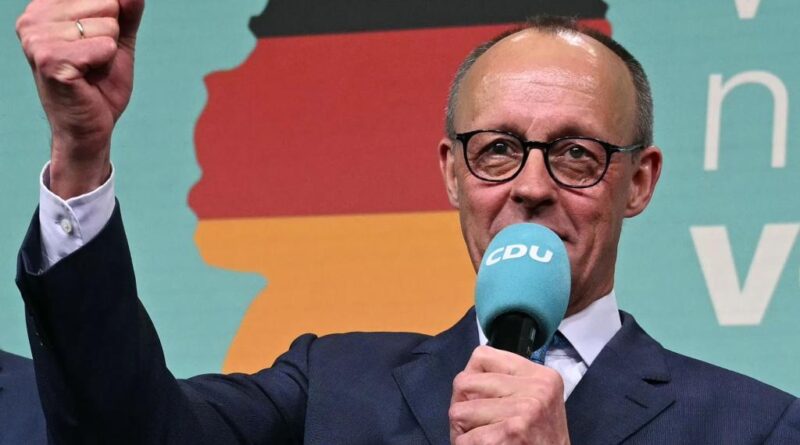Trump’s Influence Awakens Europe, as Revealed by German Elections

President Trump has devised a strategy to bolster Europe, and the outcomes of Sunday’s election in Germany indicate its effectiveness.
The center-right Christian Democrats emerged as the leading party in the Bundestag. The party’s leader, Friedrich Merz, has committed to making it his “absolute priority to enhance Europe swiftly, enabling us to gradually achieve independence from the USA.” once he takes office.
The largest opposition party in the legislature, the far-right Alternative für Deutschland, may not align with Merz’s stance on Ukraine—often accused of leaning toward Russia—but similarly advocates for more military autonomy, pressuring Merz to deliver on his promises.
This could spell disaster for NATO—couldn’t that be detrimental for Europe?
On the contrary, a Germany with enhanced capabilities is precisely what NATO requires.
During the Cold War, the responsibility for defending Europe was shared more equitably between the U.S. and its European partners, with countries like West Germany and the UK maintaining formidable military forces.
However, in recent decades, following the collapse of the Soviet Union, Europe’s most advanced nations have allowed their military capabilities to languish.
Over 500,000 West Germans were enlisted in the military when the Berlin Wall fell.
Currently, about 180,000 citizens serve in the armed forces of unified Germany—even as the largest conflict in Europe since 1945 unfolds in Ukraine.
These meager figures not only highlight military unpreparedness but also reflect a broader European unwillingness to engage in combat.
According to Gallup International polling last year, fewer than one-third of adults in EU member states are willing to take up arms to defend their country.
Globally, Gallup indicates that the countries whose citizens are “least willing” to fight for their nation are “Italy (78%), Austria (62%), Germany (57%), Nigeria (54%), and Spain (53%)”—a combination of one developing nation and four wealthy European ones, three of which are NATO members.
Trump perceives that America is being exploited by NATO allies who have both the resources and personnel to assume greater responsibility for their defense but opt instead to rely on the U.S.
They are benefiting from a free ride, or at the very least, a heavily subsidized arrangement at the expense of American taxpayers.
However, political elites across Europe aren’t merely selfish; they’re fearful.
They’re concerned that increasing defense spending could lead to the collapse of their already unsustainable welfare systems, resulting in enraged voters ousting them from power.
The irony here is that by imposing a disproportionately high share of Europe’s defense costs on Americans, these leaders have inadvertently contributed to a populist backlash in the U.S.—which explains why Europe now faces the challenge posed by Trump.
Yet, if European leaders heed the hard lessons Trump is imparting, both Europe and NATO will emerge stronger.
This not only results from NATO gaining additional forces and European nations recommitting to defend their own borders and those of their neighbors.
Furthermore, revitalizing European armed forces would counter not only the fears of the elites.
Increasing military expenditure will not destabilize Germany and other nations, where citizens are growing increasingly dissatisfied with economic conditions. Instead, it will foster national unity—something that mere prosperity cannot sustain.
Since the end of the Cold War, European elites have perceived their countries primarily as administrative zones, where the quest for an easy life is the only unifying principle.
The reality is that nations are formed on the willingness to share sacrifice, not just the pursuit of wealth.
To the extent that enhanced military readiness rekindles patriotism, it will contribute to social cohesion within Europe’s nations.
Moreover, military service can bridge social classes and regional divisions—an insight supported by the American experience.
An elite that actively participates in service gains respect from the public—a status that a purely financial or intellectual elite cannot achieve.
This elite invests itself in society by serving alongside individuals from diverse backgrounds, creating a sense of noblesse oblige.
Germany is in urgent need of an inclusive national institution to bring together its economically and culturally distinct east and west; the alienation felt by former East Germans from the West fuels support for the AfD.
Additionally, a society and elite prepared to accept greater responsibility for national defense will likely be more serious about managing issues related to migration as well.
Eight decades post-World War II, Europe’s threat does not stem from German militarism but from a lack of adequate moral and material commitment to defense.
Europe requires a renewed sense of self-reliance—not necessarily as an alternative to NATO, but as the very foundation that reinforces the alliance.
Daniel McCarthy is the editor of Modern Age: A Conservative Review and editor-at-large of The American Conservative.



